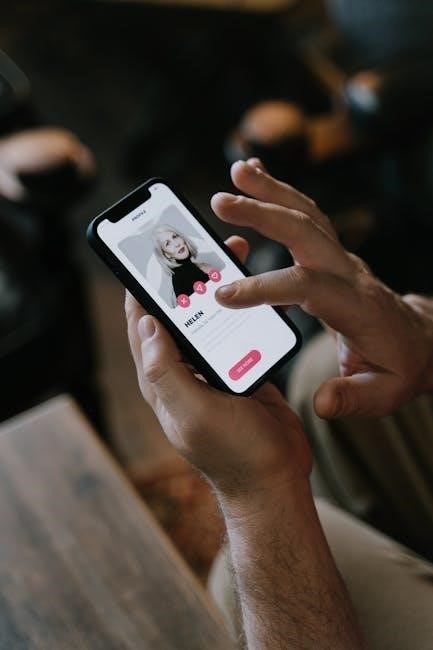Online dating can be exciting yet unpredictable, often leading to unintended failures. Common mistakes like poor profiles, unrealistic expectations, and lack of effort hinder success, making it challenging to connect meaningfully.
Why People Fail at Online Dating
People often fail at online dating due to poor profile setups, unrealistic expectations, and lack of effort in communication. Many users post unattractive photos or write vague bios, making it hard to attract meaningful matches. Others set overly high standards, seeking perfection in partners, which leads to disappointment. Some send generic messages or come off as too aggressive, while others ignore red flags. Overemphasizing physical appearance and neglecting personality traits also contribute to failure. Additionally, being inauthentic or misrepresenting oneself can build distrust. These mistakes, combined with impatience and overanalyzing conversations, often result in unsuccessful online dating experiences.
The Psychology Behind Online Dating Mistakes
The psychology behind online dating mistakes often stems from cognitive biases and emotional missteps. Many users fall into the trap of love bombing, overthinking messages, or assuming the worst about matches. Others struggle with decision paralysis due to too many choices, leading to indecision. Emotional attachment to outcomes can cause impatience, while fear of rejection fosters defensive profiles. Additionally, the tendency to idealize partners or overlook red flags due to optimism bias contributes to poor decisions. These psychological pitfalls, combined with the pressure to present a perfect online persona, often derail efforts to form genuine connections, highlighting the complexity of digital dating dynamics.
Poor Profile Setup
A poorly crafted profile often leads to failure in online dating. Using unattractive photos, writing a vague bio, and being overly negative can make your profile less appealing and hinder meaningful connections.
Using Unattractive or Inappropriate Photos
Using unattractive or inappropriate photos is a common mistake that can instantly turn potential matches away. Poor lighting, distracting backgrounds, or overly casual shots can make your profile appear less appealing. Additionally, posting photos with inappropriate content or excessive filters can create a negative first impression. These choices often lead to being overlooked or judged harshly, reducing your chances of connecting with others. Avoiding these photo mistakes is crucial to making a positive impact and increasing your likelihood of success in online dating.
Writing a Vague or Boring Bio
A vague or boring bio is a surefire way to fail at online dating. When your profile lacks specifics, it fails to capture attention or spark interest. Avoid generic statements like “I love traveling” without providing details. Being too broad or unoriginal makes it hard for potential matches to connect with you. Additionally, negative or defensive language can alienate others. A poorly written bio often comes across as lazy or uninteresting, reducing your chances of attracting meaningful connections. Make sure your bio reflects your personality and interests clearly to avoid blending into the crowd.
Being Too Negative or Defensive in Your Profile
Being overly negative or defensive in your profile is a major turnoff. Statements like “If you don’t like X, swipe left” or “I’m only here because my friends made me” come across as unwelcoming. Using aggressive or confrontational language, such as “Deal with it or you’re a terrible human,” can push potential matches away. This approach often makes you seem unapproachable or difficult to connect with. Instead of attracting the right people, you may inadvertently repel them. A defensive tone can also make it seem like you’re hiding something or lack confidence, further reducing your chances of success in online dating.

Unrealistic Expectations
Seeking perfection in a partner or setting unreasonably high standards often leads to disappointment. Expecting immediate results or ideal matches can prevent meaningful connections, fostering frustration instead of success.

Seeking Perfection in a Partner
Seeking perfection in a partner is a common yet detrimental approach in online dating. By focusing on unrealistic ideals, individuals often overlook compatible matches who could bring genuine connection and happiness. This mindset narrows potential opportunities, as no one can meet every expectation. It fosters disappointment and frustration, as real people inevitably fall short of flawless standards. Instead of allowing imperfections, this approach leads to missed chances for meaningful relationships. To avoid this pitfall, it’s essential to prioritize shared values, personality, and chemistry over unattainable perfection.
Setting Unreasonable Standards for Matches
Setting unreasonable standards for matches is a surefire way to fail at online dating. By demanding perfection or overly specific traits, you drastically limit potential connections. For instance, rigidly requiring a certain height, weight, or body type can alienate compatible individuals; This approach often stems from unrealistic expectations, leading to disappointment when real people inevitably fall short. Instead of fostering meaningful relationships, these high standards create a barrier to genuine connections. To succeed, it’s crucial to balance preferences with flexibility, allowing room for personalities and shared values to shine through.
Expecting Immediate Results
Expecting immediate results is a common pitfall in online dating. Many users anticipate instant matches, conversations, and connections, but relationships take time to develop. This impatience often leads to frustration and discouragement when results aren’t swift. Constantly checking apps or becoming disheartened by slow progress can create a negative mindset. Instead of fostering genuine connections, this approach may cause users to overlook potential matches or abandon efforts prematurely. Patience is key, as meaningful relationships require time and effort to cultivate. Avoid the mistake of rushing the process and embrace the journey of getting to know others.
Lack of Effort in Communication
Lack of effort in communication is a major obstacle in online dating. Sending generic or lazy messages, being too aggressive, or ignoring red flags can undermine meaningful connections and lead to failure.
Sending Generic or Lazy Messages
Sending generic or lazy messages is a surefire way to fail at online dating. Using uncreative openers like “Hey” or “What’s up?” without any personal touch shows a lack of effort and genuine interest. This approach often leads to unengaging conversations and missed opportunities to build meaningful connections. To ensure failure, stick to vague or uninspired messages that don’t reflect the other person’s profile or interests. Avoid asking thoughtful questions or showing curiosity, as this will make your messages feel impersonal and unoriginal, ultimately leading to disinterest and a lack of meaningful interaction.
Being Too Aggressive or Pushy
Being overly aggressive or pushy in online dating is a recipe for failure. Sending excessive messages, making bold declarations, or pushing for quick commitments can overwhelm potential matches. Love bombing, such as showering someone with intense affection early on, often leads to discomfort and disinterest. Additionally, ignoring boundaries or pressuring someone for personal information or meetups can be off-putting. To ensure failure, avoid giving matches space to breathe and disregard their comfort levels. This behavior not only damages trust but also accelerates the end of potential connections, making it clear that respect and patience are not your priorities.
Ignoring Red Flags in Conversations
Ignoring red flags in conversations is a surefire way to fail at online dating. Dismissing concerns about inconsistent stories, evasive answers, or dismissive behavior can lead to mismatched expectations. Overlooking signs of dishonesty or lack of interest signals that you’re willing to settle for less than you deserve. This approach often results in wasted time and emotional frustration. By neglecting to address these issues early on, you risk pursuing connections that are doomed from the start. Ignoring red flags not only hinders meaningful connections but also increases the likelihood of unpleasant experiences down the line;

Overemphasis on Physical Appearance
Prioritizing physical appearance over personality and interests often leads to missed opportunities for meaningful connections, as it overlooks compatibility and shared values, ensuring dating failure.
Listing Specific Height, Weight, or Body Type Requirements
Specifying exact height, weight, or body type in your profile can severely limit potential matches and may come off as shallow. This approach often leads to missed opportunities for meaningful connections, as it prioritizes physical traits over personality and shared interests. Additionally, such strict requirements can discourage potential matches from reaching out, creating a barrier to forming genuine relationships. Instead of focusing on physical attributes, consider highlighting qualities like kindness, sense of humor, or shared hobbies to attract compatible partners. This shift in focus can lead to more authentic and lasting connections.
Judging Matches Solely on Photos
Judging potential matches solely on their photos is a common mistake that can lead to missed opportunities for meaningful connections. While physical attraction is important, focusing only on appearance often results in shallow interactions and overlooks personality, interests, and shared values. This approach can also make you appear superficial, discouraging genuine individuals from engaging with you; Instead of prioritizing looks, consider reading bios and engaging in conversations to discover compatibility beyond the surface level. This balanced approach fosters deeper connections and increases the likelihood of finding a truly compatible partner.
Neglecting Personality and Interests
Neglecting to showcase your personality and interests in your profile is a significant oversight that can hinder meaningful connections. Failing to highlight what makes you unique or what you enjoy doing can make your profile seem generic and unengaging. Matches are more likely to be drawn to someone who shares similar passions or values, so omitting these details can lead to shallow interactions. By not emphasizing your personality, you risk attracting individuals who are not genuinely compatible with you, ultimately leading to unfulfilling relationships. Prioritizing physical appearance over substance often results in missed opportunities for authentic connections.
Being Inauthentic
Being inauthentic in online dating often involves misrepresenting oneself, using fake photos, or feigning interests, which can attract incompatible matches and hinder genuine connections.
Misrepresenting Yourself in Your Profile
Misrepresenting yourself in your profile is a common mistake that can lead to failed connections. By exaggerating qualities or hiding flaws, you attract matches who aren’t suited for the real you. This can result in awkward first dates or even immediate disinterest when the truth comes out. Authenticity is key to building trust and fostering meaningful relationships. Misrepresentation often stems from insecurity or fear of rejection, but it ultimately undermines the foundation of any potential partnership. Being dishonest in your profile sets you up for disappointment and wasted time.
Using Fake Photos or Information
Using fake photos or information in your profile is a surefire way to fail at online dating. Misleading images or false details create unrealistic expectations, leading to awkward first dates or immediate disinterest when the truth surfaces. This dishonest approach damages trust and credibility, making it difficult to build genuine connections. Many users are wary of fake profiles, and being caught in a lie can result in embarrassment or even account suspension. Authenticity is crucial for meaningful relationships, and using fake content only sets you up for failure and disappointment in the long run.
Pretending to Have Interests You Don’t Really Have
Pretending to have interests you don’t genuinely care about is a recipe for disaster in online dating. Claiming to love hiking or reading when you don’t can lead to awkward conversations and a lack of genuine connection. This misrepresentation creates false expectations, making it difficult to build trust and rapport. When the truth comes out, it often results in disappointment or distrust. Authenticity is key to forming meaningful relationships, so avoid faking hobbies or passions to impress potential matches. Being yourself ensures more compatible and lasting connections in the long run.
Poor Time Management
Poor time management leads to burnout and superficial connections. Spending too much time on dating apps can distract from personal growth and meaningful interactions, worsening dating outcomes.
Spending Too Much Time on Dating Apps
Spending excessive time on dating apps can lead to burnout and superficial connections. Constant swiping and analyzing conversations distract from personal growth and meaningful interactions. Overinvestment in online dating often results in overwhelm, making it harder to focus on genuine relationships. Additionally, neglecting personal boundaries and overcommitting to multiple matches can exacerbate the issue. This behavior not only hinders dating success but also fosters dissatisfaction. Balancing app usage with real-life activities is crucial to avoid falling into this common pitfall of online dating failure.
Ignoring Personal Boundaries
Ignoring personal boundaries is a significant mistake in online dating. Sharing too much personal information too quickly can lead to discomfort or even safety risks. Additionally, not respecting your own limits, such as constantly responding to messages late at night or agreeing to meet in unsafe locations, can create an unhealthy dynamic. Overcommitting to multiple matches without clear communication also blurs boundaries, leading to confusion and dissatisfaction. Neglecting these boundaries often results in overwhelming situations and missed opportunities for genuine connections, ultimately contributing to online dating failure.
Overcommitting to Multiple Matches

Overcommitting to multiple matches is a common mistake that leads to online dating failure. Juggling too many conversations can spread you thin, making it difficult to build meaningful connections. Constantly dividing your attention among several people often results in shallow interactions and missed opportunities for deeper relationships. Additionally, overcommitting can lead to burnout, as managing multiple expectations becomes overwhelming. This approach not only frustrates potential matches but also reduces your chances of finding a genuine connection. By spreading yourself too thin, you risk failing to nurture any relationship effectively, ultimately contributing to your online dating struggles.

Safety Mistakes
Sharing personal information too quickly and not verifying matches’ identities can lead to unsafe situations. Agreeing to meet in unsafe locations increases risks, compromising personal security and trust.
Sharing Personal Information Too Quickly
Revealing sensitive details like your address, workplace, or phone number early in online interactions can jeopardize your safety. Dating sites often lack thorough vetting processes, making it easy for potential stalkers or scammers to exploit such information. Sharing personal data prematurely bypasses critical safeguards, increasing the risk of harassment or identity theft. This oversight not only endangers your privacy but also undermines the trust-building process essential for meaningful connections. By prioritizing convenience over caution, you expose yourself to unnecessary vulnerabilities, making it easier for malicious individuals to target you. This mistake can lead to severe consequences, highlighting the importance of maintaining boundaries.
Not Verifying Matches’ Identities
Failing to confirm the authenticity of potential matches can lead to dangerous situations. Many dating platforms lack strict verification processes, leaving users vulnerable to scams or catfishing. Without verifying identities through social media profiles or video calls, you risk engaging with fraudulent individuals. This oversight can result in emotional distress, financial loss, or even physical harm. By neglecting to take these simple steps, you expose yourself to unnecessary risks, making it easier for dishonest people to deceive you. This mistake underscores the importance of prioritizing safety and due diligence in online interactions.
Agreeing to Meet in Unsafe Locations
Meeting a stranger in an isolated or unfamiliar location is a critical mistake. Choosing secluded spots or private residences for a first date can expose you to risks like robbery, assault, or worse. Experts warn that failing to prioritize safety can lead to dangerous situations. Instead of meeting in public, well-lit areas with friends nearby, agreeing to unsafe locations increases vulnerability. This oversight can result in severe consequences, emphasizing the importance of prioritizing personal safety above convenience or spontaneity. Always opt for secure, public spaces and inform someone about your plans to avoid potential threats.

Lack of Patience
Rushing connections or expecting instant results often leads to disappointment. Impatience can cause premature judgments, missed opportunities, and frustration, undermining the gradual process of building meaningful relationships online.
Expecting Instant Chemistry
Expecting immediate sparks or deep connections can lead to disappointment. Chemistry often develops over time through meaningful interactions. Rushing this process or dismissing potential matches too quickly can prevent genuine relationships from forming. Many people overlook the importance of gradual bonding, focusing instead on fleeting attraction. This impatience can cause missed opportunities for deeper connections. Instead of waiting for instant chemistry, focus on building rapport and understanding. Avoid overanalyzing messages or interactions, as this can create unnecessary pressure. Give matches a fair chance to grow into something meaningful, rather than expecting everything to click right away.
Not Giving Matches a Fair Chance
Quickly dismissing potential matches without genuine interaction is a common mistake. Judging someone solely on minor flaws or initial impressions can prevent meaningful connections. Relationships often develop over time, and not giving people a chance to showcase their personality and interests can lead to missed opportunities. Avoid snap judgments based on superficial traits or overly high standards. Instead, engage openly and allow conversations to unfold naturally. Giving matches a fair chance to demonstrate their compatibility can lead to unexpected and rewarding connections. Patience and openness are key to avoiding this pitfall and fostering genuine relationships.
Getting Discouraged After a Few Rejections
Allowing a few rejections to dampen your spirits is a surefire way to fail at online dating. Rejection is inevitable, but letting it discourage you halts progress. Many people give up after a handful of unsuccessful matches, convinced they’re not cut out for online dating. However, persistence is key. Every rejection brings you closer to the right match. Instead of getting disheartened, focus on improving your approach and staying positive. Remember, rejection doesn’t define your worth—it’s simply part of the process. Keep going, and you’ll increase your chances of success in the long run.

Overanalyzing Conversations
Overanalyzing conversations leads to unnecessary stress and missed connections. Reading too much into messages can prevent genuine interactions and create misunderstandings, hindering potential relationships.

Reading Too Much Into Every Message
Overanalyzing every message can lead to unnecessary stress and misunderstandings. Constantly decoding words or tone often creates anxiety, preventing genuine connections. Assuming hidden meanings or worst-case scenarios fosters doubt, making it harder to engage authentically. This habit can escalate minor issues into major concerns, causing potential matches to feel smothered or misinterpreted. Instead of enjoying the conversation, overthinking distracts from building rapport. It’s essential to maintain a balanced perspective and avoid projecting expectations onto others’ words. By keeping interactions light and focused on mutual interests, you can foster meaningful dialogue without the burden of overinterpretation.

Overthinking Responses
Spending too much time crafting the perfect reply can backfire, making conversations feel forced or insincere. Overthinking responses often leads to delays, causing matches to lose interest or perceive you as distant. Constantly second-guessing what to say can create anxiety, making it harder to connect naturally. This habit fosters self-doubt and may lead to missed opportunities. Instead of focusing on imperfections, embrace authenticity and let the conversation flow organically. Overthinking not only wastes time but also prevents genuine connections from forming. It’s better to be spontaneous and true to yourself than to overanalyze every word.
Assuming the Worst About Matches
Assuming the worst about matches can sabotage potential connections before they even begin. Overanalyzing messages or jumping to negative conclusions often leads to unnecessary stress and missed opportunities. Constantly questioning a match’s intentions or overinterpreting minor details fosters distrust and anxiety. This mindset can cause you to misread genuine interest or overlook compatible partners. By assuming the worst, you create a self-fulfilling prophecy, pushing people away or ending conversations prematurely. This negative approach not only harms your chances of success but also makes the online dating experience more frustrating and discouraging. It’s essential to remain open-minded and give matches a fair chance.
Common Online Dating Pitfalls
Common online dating pitfalls include casting too wide a net, being overly picky, and failing to learn from past mistakes, hindering meaningful connections and growth.
Casting Too Wide of a Net
Casting too wide of a net is a common pitfall in online dating, where users broaden their preferences excessively to attract more matches. While it may seem logical to increase options, this approach often leads to overwhelm and decision fatigue. With too many potential matches, it becomes difficult to meaningfully engage with anyone, reducing the likelihood of forming genuine connections. Additionally, being overly broad in criteria can attract incompatible partners, wasting time and effort. This strategy often results in superficial interactions rather than meaningful relationships, highlighting the importance of focusing on compatibility and shared values from the start.
Being Too Picky or Indecisive
Being overly selective or indecisive is a significant obstacle in online dating, often leading to missed opportunities. Many users set unrealistic standards, dismissing potential matches for minor flaws or overanalyzing profiles. This hyper-selectivity stems from the abundance of options, creating a paradox of choice. Indecisiveness further exacerbates the issue, as users hesitate to commit, fearing they might find someone “better.” This mindset fosters a cycle of dissatisfaction, making it difficult to form meaningful connections. By prioritizing perfection over compatibility, individuals inadvertently sabotage their chances of building lasting relationships, highlighting the importance of balancing standards with openness to genuine engagement.
Not Learning from Past Mistakes
One of the most detrimental habits in online dating is failing to learn from past errors. Repeatedly making the same mistakes, such as ignoring red flags or using unattractive photos, leads to consistent disappointment. Many users overlook feedback or dismiss constructive criticism, continuing to sabotage their efforts. For instance, if generic messages consistently yield no responses, sending the same tired lines again won’t improve results. To truly fail, embrace a cycle of repetition, refusing to adapt or grow. This approach ensures ongoing frustration and missed opportunities, solidifying your place in the cycle of unsuccessful online dating experiences.
In conclusion, failing at online dating is a journey of embracing mistakes and missed opportunities. By ignoring feedback and repeating errors, you ensure lasting singledom and endless frustration.
Final Thoughts on Failing at Online Dating
Failing at online dating is an art that requires persistence in making the same mistakes repeatedly. By ignoring feedback, avoiding self-reflection, and refusing to adapt, you ensure a cycle of rejection and disappointment. Embrace unrealistic expectations, neglect personal growth, and prioritize superficial traits over meaningful connections. Avoid learning from past experiences, and instead, double down on strategies that consistently fail. Remember, the key to failing at online dating is to stay rigid, unauthentic, and disconnected from the needs of others. With dedication, you can guarantee a lifetime of missed opportunities and lonely nights.
How to Avoid These Mistakes in the Future
To avoid failing at online dating, focus on self-awareness and growth. Reflect on past experiences to identify patterns and areas for improvement. Be authentic in your profile and conversations, avoiding generic messages or overly aggressive behavior. Set realistic expectations and prioritize meaningful connections over superficial traits. Balance effort with patience, allowing relationships to develop naturally. Stay open to feedback and willing to adapt your approach. By addressing these common pitfalls, you can enhance your online dating journey and increase your chances of forming genuine connections.
